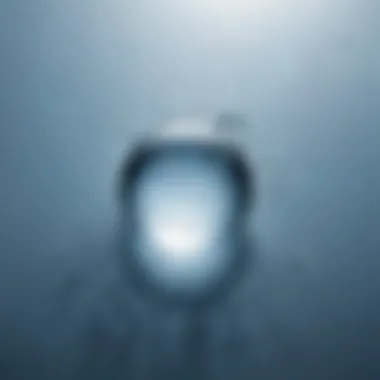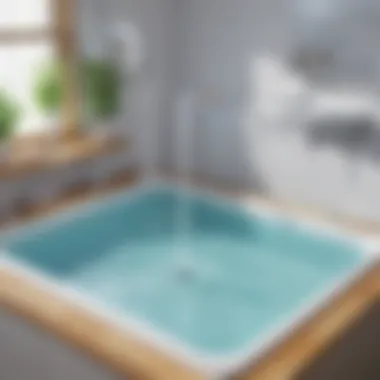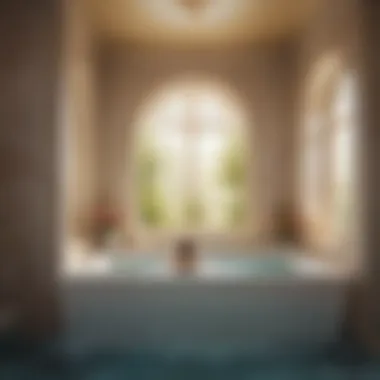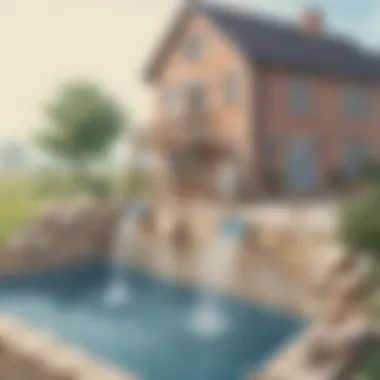The Ultimate Guide to Softening Hard Water for Luxurious Bathing


Science Fun Facts
Water is an essential part of our daily lives, from quenching our thirst to keeping us clean during bath time. Did you know that water quality can vary depending on where you live? This is due to a term called 'hard water,' which contains high levels of minerals like calcium and magnesium. As a result, when hard water mixes with soap, it forms a scummy residue instead of creating lather easily. Understanding how to transform hard water into soft water can greatly improve your bathing experience and ensure your skin and hair stay healthy and clean.
Discover the Wonders of Science
Let's delve deeper into the science behind water softening. Essentially, soft water is achieved by removing the minerals that cause water hardness. Through a process called ion exchange, calcium and magnesium ions in hard water are replaced with sodium ions, resulting in softened water that is gentler on your skin and hair. Explore educational videos and animations that illustrate this fascinating scientific process, and discover how this knowledge can be applied in real-life scenarios to enhance personal hygiene practices.
Science Experiment Showcase
Transforming hard water into soft water can be considered a fun and engaging experiment, especially for those curious about chemistry and home improvement. By following step-by-step instructions using simple materials like water softening tablets or a water softener unit, you can witness firsthand the transformation of hard water into a softer, more luxurious bathing solution. Remember to prioritize safety by wearing gloves and goggles when handling any chemicals, and refer to safety tips and precautions to ensure a successful and risk-free experiment.
Understanding the Impact of Hard Water on Bathing
Hard water is a common household issue that can significantly impact the bathing experience. Its high mineral content, including calcium and magnesium, can lead to various problems such as dry skin, dull hair, and soap scum buildup. Understanding the impact of hard water on bathing is crucial for maintaining skin and hair health. By addressing these challenges, individuals can achieve a more refreshing and enjoyable bathing routine.
Introduction to Hard Water
Definition and Characteristics of Hard Water
Hard water is characterized by an excess of minerals, particularly calcium and magnesium ions. These minerals interact with soap, forming a precipitate that can leave a residue on the skin and hair. The presence of these minerals also contributes to scale accumulation in pipes and fixtures, reducing the efficiency of water heating systems. This characteristic makes hard water a less desirable choice for bathing, as it can lead to skin dryness and hair dullness.
Signs of Hard Water in Bathing Experience


Signs of hard water in a bathing experience include difficulty lathering soap, feeling a filmy residue after washing, and noticing mineral deposits on fixtures. These signs indicate the presence of minerals in the water that affect the cleansing ability of soap and can leave a dulling residue on the skin and hair. Recognizing these signs is essential for individuals to take corrective measures to soften their water for a better bathing experience.
Effects of Hard Water on Skin and Hair
Dryness and Irritation
One of the primary effects of hard water on the skin is dryness and irritation. The minerals in hard water strip away the skin's natural oils, leading to dry, itchy skin. Regular exposure to hard water can exacerbate skin conditions such as eczema and dermatitis. Ensuring water softening techniques can help alleviate these symptoms and restore skin moisture.
Buildup of Mineral Deposits
Another effect of hard water is the buildup of mineral deposits on the hair. Calcium and magnesium ions in hard water can combine with hair products, forming a sticky residue that weighs down the hair and reduces its natural shine. Continuous exposure to hard water can result in a lackluster appearance and difficulty in managing hair. Implementing strategies to soften hard water can prevent mineral buildup and maintain hair health.
Methods to Soften Hard Water for Bathing
When delving into the realm of converting hard water into soft water, the section on methods to soften hard water for bathing serves as a crucial focal point. The significance of this topic lies in addressing the challenges wrought by hard water with a keen focus on ensuring a luxurious and revitalizing bathing experience. By exploring various techniques and remedies to soften hard water, individuals can enhance their bathing routines substantially. The methods discussed in this section are geared towards offering practical solutions to combat the adverse effects of hard water on skin and hair while elevating the overall bathing experience.
Water Softening Techniques
Water Softeners
Water softeners are an integral component in the process of converting hard water into soft water for bathing purposes. Their primary function revolves around effectively reducing the mineral content in water, thereby minimizing the negative impacts of hard water on skin and hair. The key characteristic of water softeners lies in their ability to comprehensively remove calcium and magnesium ions from the water, resulting in a softer and more skin-friendly bathing experience. This makes water softeners a popular and beneficial choice for individuals seeking to ameliorate the effects of hard water during bathing. Although water softeners require regular maintenance and upkeep, their unparalleled ability to soften water efficiently renders them indispensable in the quest for a luxurious bathing experience.
Using Distilled White Vinegar


In the realm of softening hard water, the utilization of distilled white vinegar emerges as a cost-effective and eco-friendly solution. The key characteristic of using distilled white vinegar lies in its acidic nature, which aids in breaking down the mineral deposits found in hard water. This contributes significantly to reducing the hardness of water, thereby enhancing its suitability for bathing purposes. The unique feature of using distilled white vinegar lies in its versatility, as it can also serve as a natural cleaning agent for bathroom fixtures and surfaces. While using distilled white vinegar is advantageous in terms of affordability and environmental impact, some individuals may find its odor off-putting. Despite this drawback, the benefits of incorporating distilled white vinegar as a water-softening agent in bathing routines are noteworthy.
Boiling and Cooling Method
Another viable method for softening hard water involves utilizing the boiling and cooling technique. This process entails boiling hard water to precipitate the mineral deposits and then allowing it to cool before use. The key characteristic of the boiling and cooling method lies in its simplicity and accessibility, as it requires minimal resources and effort to execute. By precipitating the mineral deposits through boiling, the water becomes softer, thereby mitigating issues such as skin dryness and hair dullness. The unique feature of this method lies in its immediate effectiveness, as individuals can observe visible improvements in the water's texture post-treatment. While the boiling and cooling method is a popular choice for its simplicity, individuals should be cautious not to scald themselves during the boiling process, highlighting a potential disadvantage of this water-softening technique.
DIY Remedies for Softening Hard Water
Baking Soda Soak
Among the DIY remedies for softening hard water, the baking soda soak stands out as a convenient and accessible solution. The key characteristic of the baking soda soak lies in its alkaline nature, which helps neutralize the mineral content in hard water. This neutralization process contributes to softening the water and enhancing its suitability for bathing, resulting in smoother skin and silkier hair. The unique feature of the baking soda soak lies in its versatility, as it can also serve as a gentle exfoliant for the skin, further enhancing the bathing experience. While the baking soda soak offers numerous benefits in terms of water softening and skin care, individuals with sensitive skin may need to patch-test this remedy to prevent potential irritations.
Lemon Juice Rinse
Alternatively, the lemon juice rinse presents itself as a refreshing and aromatic method for softening hard water. The key characteristic of the lemon juice rinse lies in its acidic properties, which aid in breaking down mineral deposits and reducing water hardness. This contributes to a revitalizing bathing experience, leaving the skin feeling invigorated and rejuvenated. The unique feature of the lemon juice rinse lies in its pleasant scent and clarifying effect on both skin and hair. Despite its benefits, individuals with existing skin sensitivities may need to dilute the lemon juice to prevent adverse reactions. Overall, the incorporation of lemon juice as a water-softening agent adds a zesty touch to bathing routines while effectively combating the effects of hard water on the body.
Ensuring Optimal Bathing Experience with Softened Water
In this section, we delve deep into the importance of ensuring an optimal bathing experience with softened water. Softened water plays a crucial role in enhancing our bathing routines by providing a luxurious and refreshing experience. By using softened water for bathing purposes, we can mitigate the negative effects of hard water on our skin and hair, ultimately promoting better health and well-being. The soft water eliminates the harshness and mineral buildup that hard water causes, allowing for a smoother and more hydrating bath.
Benefits of Soft Water for Bathing
Smooth and Hydrated Skin


Smooth and hydrated skin is a key benefit of using softened water for bathing. The soft water helps to maintain the skin's natural moisture barrier, preventing dryness and irritation. It leaves the skin feeling smoother, suppler, and more refreshed after each bath. This characteristic of soft water is highly beneficial for individuals with sensitive or dry skin, as it helps to soothe and hydrate the skin effectively. The uniqueness of smooth and hydrated skin lies in its ability to enhance the overall bathing experience, making it a popular choice for those seeking a rejuvenating soak.
Lustrous Hair
Another significant advantage of using softened water is the effect it has on hair. Soft water helps to keep the hair cuticles smooth and prevents mineral buildup, resulting in lustrous and shiny hair. It reduces issues like frizziness and dullness, making the hair more manageable and healthy. The unique feature of lustrous hair achieved through soft water baths enhances the overall appearance and health of the hair, making it a preferred choice for individuals looking to improve hair quality.
Tips for Maintaining Soft Water Quality
Regular Cleaning of Fixtures
Regular cleaning of fixtures is essential for maintaining soft water quality. Clean fixtures help to prevent mineral deposits from building up and clogging the water flow, ensuring that the soft water remains effective for bathing purposes. The key characteristic of regular fixture cleaning is its ability to prolong the lifespan of water softening systems and maintain optimal water quality over time. By regularly cleaning fixtures, we can ensure a consistent supply of soft water for a luxurious bathing experience.
Monitoring Water Hardness Levels
Monitoring water hardness levels is crucial for maintaining soft water quality. By testing the water hardness regularly, we can adjust the water softening systems as needed to ensure that the water remains adequately softened. The key characteristic of monitoring water hardness levels is its ability to prevent the negative effects of hard water from returning. By staying vigilant and proactive in monitoring water hardness levels, we can continue to enjoy the benefits of soft water for our bathing needs.
Conclusion
In the realm of bath-time luxuries, the significance of achieving soft water cannot be overstated. As we navigate the complexities of water quality and its impact on our bathing experiences, the conclusion serves as the pinnacle of our journey. By softening hard water, we pave the way for a transformation in the way we care for our skin and hair, unlocking a realm of benefits that resonate deeply with our well-being.
Achieving Luxurious Baths with Softened Water
Summarizing the Benefits of Soft Water
Soft water transcends mere liquid; it embodies a realm of subtle yet profound advantages that elevate our bathing escapades. Through the delicate touch of soft water, our skin is enrobed in a velvety caress, fostering unparalleled smoothness and hydration. This essence of softness not only captivates our senses but also nurtures our skin's natural radiance, making every dip a rejuvenating experience. The intrinsic allure of soft water lies in its ability to cleanse without striping, to replenish without harshness, offering a holistic bathing encounter that transcends the ordinary. Its gentle nature bestows a lustrous sheen upon our hair, transforming strands into cascading ribbons of silk. The merit of summarizing the benefits of soft water rests in its capacity to redefine our bathing rituals, infusing them with a touch of indulgence and care that resonates long after the final drop cascades.
Final Thoughts on Enhancing Bathing Experience
Culminating our discourse on soft water, we embark on a voyage to enhance the very fabric of our bathing regimen. The pivotal aspect of final thoughts on enhancing bathing experience encapsulates a wellspring of insights on savoring each moment spent under the affectionate flow of softened water. It underscores the importance of mindfulness in our bathing rituals, urging us to revel in the simplicity of self-care. Moreover, it underscores the imperative nature of intentional relaxation, transforming each bath into a sanctuary of tranquility and rejuvenation. The unique allure of these final reflections lies in their ability to infuse our bathing routines with a sense of purpose and mindfulness, redefining each splash as a moment of serenity and self-care. While the journey to softened water may seem but a humble endeavor, the transformative power it wields in elevating our bathing experience is nothing short of profound.







